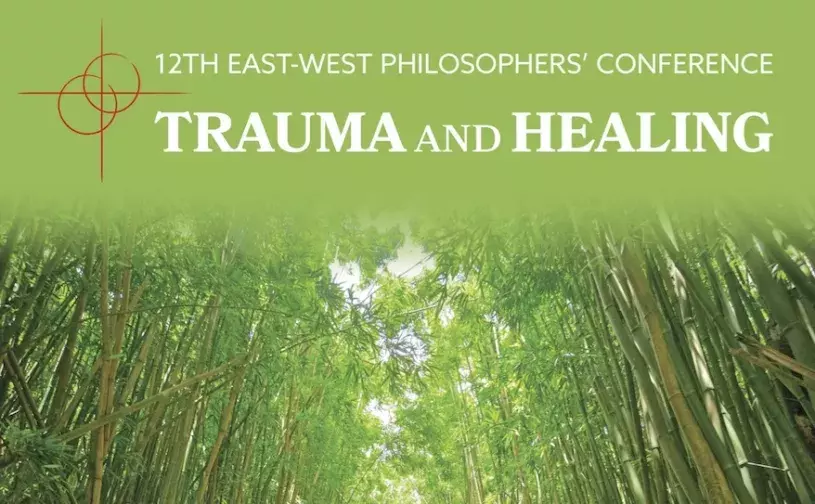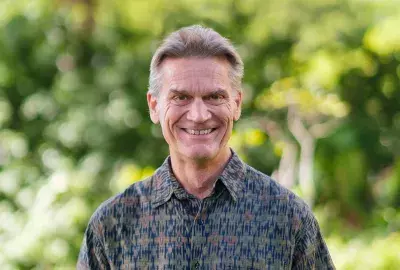
OFFICE/DEPARTMENT
Add to Calendar
For nearly 85 years, the East-West Philosophers’ Conference series has convened some of the world’s most prominent philosophers to engage in impactful dialogues on themes of global significance. A collaboration between the University of Hawai‘i at Mānoa and the East-West Center for decades, the Conference is the premier forum for convening philosophers who are committed to cross-cultural inquiry. It is also the oldest continuous international gathering in Hawai‘i.
The 12th East-West Philosophers’ Conference, which is open to the public free of charge, will explore the many dimensions of trauma and healing. While trauma can be physical, it can also be psychological, social, political, economic, and cultural. Participants are invited to reflect upon the complexity of both trauma and healing, and the forms of personal and social amnesia that make the repetition of trauma so tragically common.
Keynote presenters:
- Jin Y. Park, Chair of Philosophy and Religion at American University, Washington DC
Topic: “Translating Violence.” - Ato Quayson, Jean G. and Morris M. Doyle Professor of Interdisciplinary Studies at Stanford University, CA
Topic: “The Ethnography of the Private Sphere: Trauma, Domesticity, and Healing in the Work of Toni Morrison.”
About the East-West Philosophers’ Conference
In 1939, three University of Hawai‘i visionaries—Professors Charles A. Moore, Wing-tsit Chan, and Gregg Sinclair—initiated the first East-West Philosophers’ Conference in Honolulu. Its aim was to explore the significance of Eastern ways of thinking as a complement to Western thought, and to distill a possible synthesis of the ideas and ideals that are aspired to in these unique traditions. Cross-cultural philosophy has evolved from this earliest idea to pursue mutual respect and accommodation among the world’s cultures.
In the 11 Conferences that have been held once or twice a decade since then—typically attracting more than 300 participants from up to 40 countries across the globe—the series has been successful in fostering dialogue among diverse philosophical traditions. Volumes from papers presented at these conferences have been published by the University of Hawai‘i Press to share their themes with, and promote further discussion among, the world academic community.
For nearly 85 years, the East-West Philosophers’ Conference series has convened some of the world’s most prominent philosophers to engage in impactful dialogues on themes of global significance. A collaboration between the University of Hawai‘i at Mānoa and the East-West Center for decades, the Conference is the premier forum for convening philosophers who are committed to cross-cultural inquiry. It is also the oldest continuous international gathering in Hawai‘i.
The 12th East-West Philosophers’ Conference, which is open to the public free of charge, will explore the many dimensions of trauma and healing. While trauma can be physical, it can also be psychological, social, political, economic, and cultural. Participants are invited to reflect upon the complexity of both trauma and healing, and the forms of personal and social amnesia that make the repetition of trauma so tragically common.
Keynote presenters:
- Jin Y. Park, Chair of Philosophy and Religion at American University, Washington DC
Topic: “Translating Violence.” - Ato Quayson, Jean G. and Morris M. Doyle Professor of Interdisciplinary Studies at Stanford University, CA
Topic: “The Ethnography of the Private Sphere: Trauma, Domesticity, and Healing in the Work of Toni Morrison.”
About the East-West Philosophers’ Conference
In 1939, three University of Hawai‘i visionaries—Professors Charles A. Moore, Wing-tsit Chan, and Gregg Sinclair—initiated the first East-West Philosophers’ Conference in Honolulu. Its aim was to explore the significance of Eastern ways of thinking as a complement to Western thought, and to distill a possible synthesis of the ideas and ideals that are aspired to in these unique traditions. Cross-cultural philosophy has evolved from this earliest idea to pursue mutual respect and accommodation among the world’s cultures.
In the 11 Conferences that have been held once or twice a decade since then—typically attracting more than 300 participants from up to 40 countries across the globe—the series has been successful in fostering dialogue among diverse philosophical traditions. Volumes from papers presented at these conferences have been published by the University of Hawai‘i Press to share their themes with, and promote further discussion among, the world academic community.











